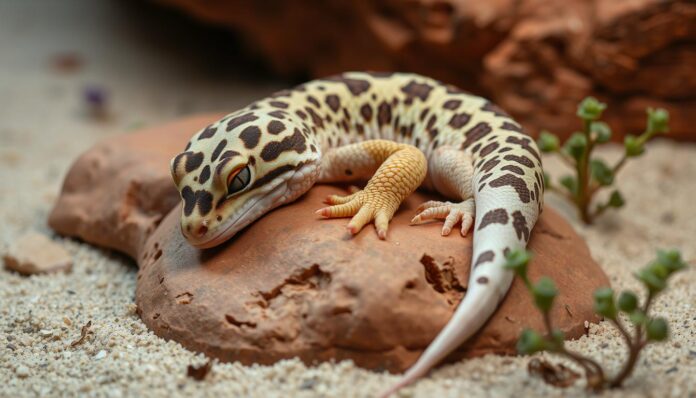Why is My Leopard Gecko Sleeping So Much?
As a leopard gecko owner, you might wonder why your pet sleeps a lot. Leopard geckos are most active at dusk and dawn. They sleep a lot during the day, which is normal.
It’s important to know about leopard gecko sleep patterns. This helps you figure out if your pet’s sleep is okay or if there’s a problem.
Leopard gecko care tips say older geckos sleep more. This is because they move less and their metabolism slows down. Changes in sleep can mean stress, illness, or changes in their environment. So, watching your pet’s behavior is key.
If you’re worried about your leopard gecko’s sleep, learning about normal sleep patterns is vital. Knowing what might affect their sleep is also important.
Understanding why your leopard gecko sleeps a lot helps keep them healthy and happy. A good diet, a comfy habitat, and the right temperature can help them sleep better. Keep reading to learn more about caring for your leopard gecko and creating a great sleep space for them.
Understanding Normal Leopard Gecko Sleep Patterns
Leopard geckos are most active at night and sleep during the day. Their leopard gecko sleeping behavior is shaped by their natural habitat and light cycles. In the wild, they hunt at night to avoid predators and find food.
Knowing what’s normal for your leopard gecko’s sleep is key. They sleep for about 12 hours a day, with 12 hours of light and 12 hours of dark. It’s important to give them a quiet, dark spot to rest during the day.
Natural Sleep-Wake Cycle
Leopard geckos’ sleep-wake cycle is controlled by light and dark. At night, they hunt and move around, using their big vertical pupils to see in the dark. You can use dim lights or reptile night lamps to see them at night.
Average Sleep Duration
Leopard geckos usually sleep for 12-14 hours, which is typical for them. Older geckos sleep more than younger ones because they are less active and have slower metabolisms.
Typical Activity Periods
Leopard geckos are most active at night. They hunt, eat, and explore during this time. Knowing their sleep patterns and leopard gecko activity levels helps you care for them better.
Understanding your leopard gecko’s sleep and activity helps you care for them well. This ensures they stay healthy and happy.
Signs Your Leopard Gecko is Sleeping Too Much
Leopard geckos need sleep to rest and recharge, just like us. But, sleeping too much can mean they’re not feeling well. Look out for signs like being very tired, not wanting to eat, and not responding to you.
Watching your gecko’s behavior is key. If they’re sleeping a lot, it’s time to see a vet. A vet can find out why they’re sleeping so much and help fix it.
Many things can make a leopard gecko sleep too much. Age, season, being sick, stressed, eating poorly, or not getting enough light are some. Older geckos sleep more, and they might sleep more in the winter. A bad diet or not enough light can also mess up their sleep.
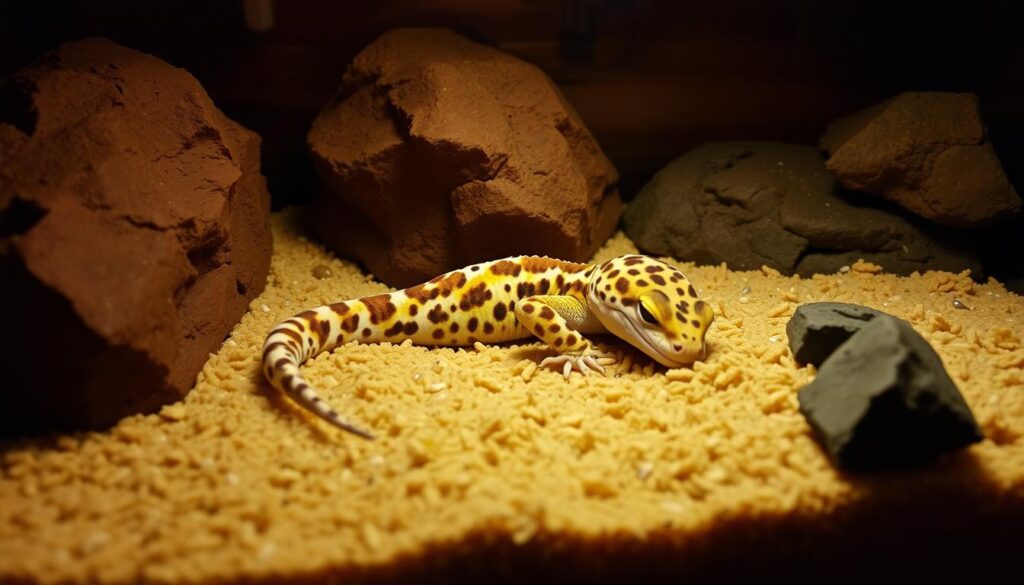
- Age: Older leopard geckos tend to sleep more due to decreased activity levels and metabolism.
- Season: Leopard geckos may sleep more during the winter months when temperatures are cooler.
- Illness: Sleepiness can be a symptom of illness in leopard geckos, such as respiratory infections or parasites.
Knowing these factors and watching your gecko can help spot problems early. If you’re worried about your gecko’s sleep, always talk to a vet for advice.
Environmental Factors Affecting Sleep Behavior
Leopard geckos are very sensitive to their surroundings. Different factors can change how they sleep. Knowing these factors is key to taking good care of them.
Things like temperature, light, and their home setup can really affect their sleep. It’s important to understand these to help your gecko sleep well.
Temperature Fluctuations
Changes in temperature can mess with a leopard gecko’s sleep. If it’s too hot or too cold, they can get stressed. This stress can make it hard for them to sleep well.
To keep your gecko comfortable, keep the temperature right. Aim for 28-30°C at the warm end and 24-26°C at the cool end.
Lighting Conditions
Lighting is also very important for a leopard gecko’s sleep. The wrong light can stress them out and hurt their sleep. It’s best to have a light cycle of 12 hours on and 12 hours off.
Habitat Setup Impact
A good home setup can help your gecko sleep better. Make sure their home is comfy and safe. Add hiding spots and places to climb.
By following these tips, you can make a great home for your gecko. This will help them sleep well and be happy.
Why is My Leopard Gecko Sleeping So Much: Common Causes
Leopard geckos are nocturnal, so they sleep a lot. But, if your gecko sleeps too much, it might be sick. Issues like leopard gecko health concerns, temperature changes, and not enough food can cause this.
Several things can make a leopard gecko sleep a lot. These include:
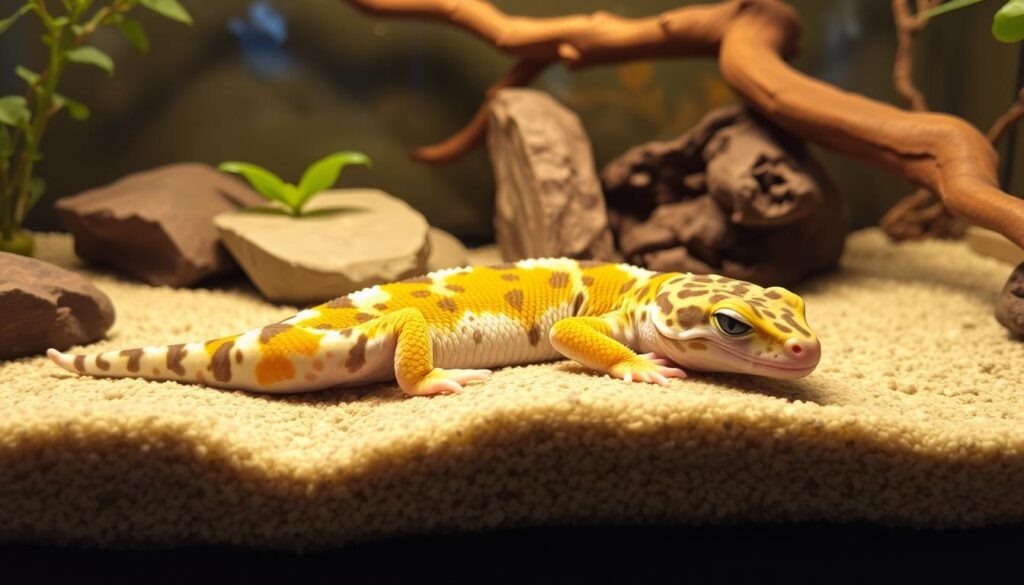
- Temperature: They need a warm spot to bask and a cooler area to sleep. The basking spot should be between 90-95°F, and the cooler spot around 75-80°F.
- Humidity: They like a humid environment, with the main area at 30-40% humidity. The humid hide should be above 80%.
- Nutrition: Leopard geckos eat only insects. They need a diet full of different insects to stay healthy.
It’s important to find out why your gecko is sleeping a lot. A vet can help figure it out and suggest how to fix it. Knowing why your gecko sleeps a lot helps keep them healthy and happy.
| Cause | Description |
|---|---|
| Health Issues | Respiratory infections, metabolic bone disease, and other health issues can cause excessive sleeping in leopard geckos. |
| Environmental Factors | Temperature fluctuations, humidity levels, and lighting conditions can affect a leopard gecko’s sleep patterns. |
| Nutritional Deficiencies | A lack of essential nutrients, such as calcium and vitamin D3, can lead to health issues and excessive sleeping in leopard geckos. |
Seasonal Changes and Brumation Effects
Leopard geckos, like many reptiles, feel the change of seasons. This can change how they sleep. In winter, they might sleep a lot, which is called brumation. It’s a way for them to save energy when food is scarce.
Knowing leopard gecko behavior is key to telling if they’re brumating or sick. Leopard gecko care tips suggest watching their weight and how much they drink. Losing more than 10% of their weight could mean trouble.
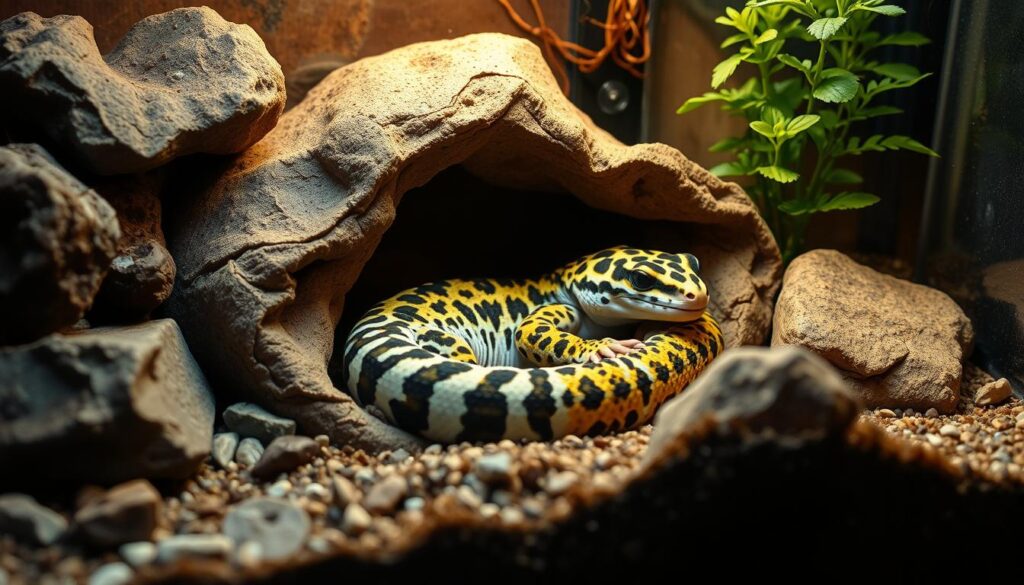
To help your leopard gecko during brumation, make sure their environment is right. They need a cool spot, around 20-22°C, and a bit of humidity, 30-40%. A leopard gecko care tips guide can show you how to set this up.
| Brumation Duration | Recommended Temperature | Humidity Level |
|---|---|---|
| 6-8 weeks | 20-22°C | 30-40% |
By following these leopard gecko care tips and understanding leopard gecko behavior, you can ensure your pet stays healthy through the seasons and brumation.
Health Issues That May Cause Excessive Sleep
Leopard geckos can face health problems that make them sleep a lot. Respiratory infections, metabolic bone disease, and parasites are common issues. If your gecko sleeps too much, see a vet to check for health problems.
Some health issues that might make a leopard gecko sleep a lot include:
- Respiratory infections, which can be caused by bacteria, viruses, or fungi
- Metabolic bone disease, which can be caused by a lack of calcium or vitamin D3
- Parasites, such as mites, ticks, or worms, which can cause discomfort and stress
Watch your gecko for signs of illness like lethargy, loss of appetite, or trouble breathing. Regular vet visits can catch health problems early. This helps prevent serious issues and keeps your gecko healthy.
Many things can affect a leopard gecko’s sleep, including health issues. Knowing about common health problems helps owners keep their pets healthy. By watching your gecko, feeding it right, and keeping its home clean, you can help it stay well.
| Health Issue | Description | Symptoms |
|---|---|---|
| Respiratory Infections | Bacterial, viral, or fungal infections | Lethargy, loss of appetite, difficulty breathing |
| Metabolic Bone Disease | Lack of calcium or vitamin D3 | Softening of bones, lethargy, loss of appetite |
| Parasites | Mites, ticks, or worms | Discomfort, stress, lethargy |
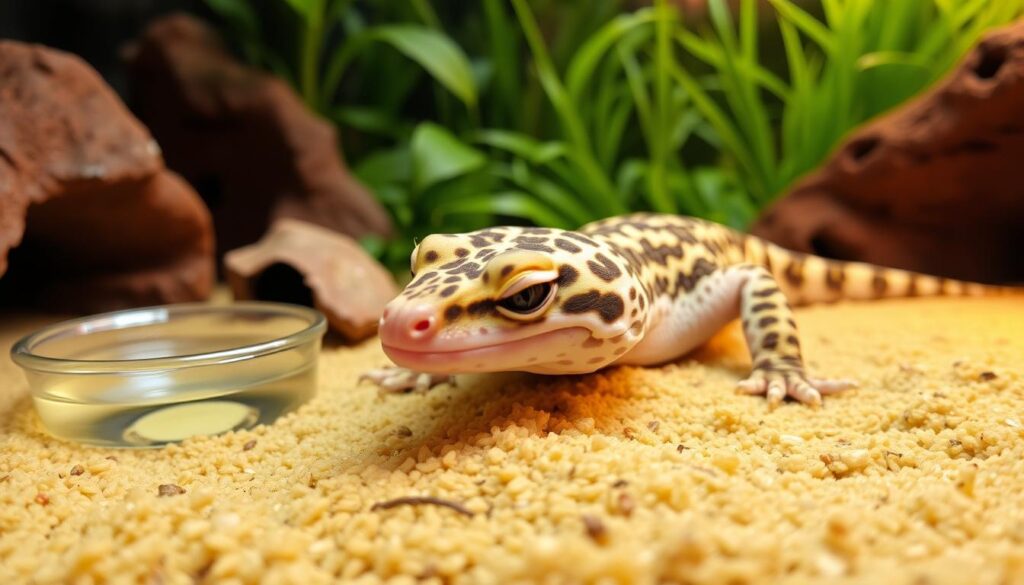
The Role of Diet in Sleep Patterns
A balanced diet is key for a leopard gecko’s health, including sleep. Giving them leopard gecko care tips on food helps their sleep-wake cycle. A diet full of nutrients helps keep their sleep patterns regular, which is vital for their leopard gecko behavior and health.
Some important diet points for leopard geckos include:
- Nutritional needs: A diet with live insects and commercial pellets is best.
- Feeding schedule: A regular feeding schedule helps their sleep patterns.
- Supplements: Adding supplements ensures they get all needed nutrients for health and sleep.
By following these leopard gecko care tips and feeding them well, you support their sleep and health. Watching their leopard gecko behavior and adjusting their diet is also key. This ensures they get the nutrients they need for good health and sleep.
Stress Factors Contributing to Increased Sleep
Leopard geckos, like many animals, can get stressed. This stress can make them sleep more. Factors like handling, environment, and social interaction can cause this. It’s important to keep their environment calm and comfortable to help them sleep better.
Changes in their environment, like a new home or tank mates, can stress them out. Handling them too much or roughly can also be stressful. Leopard geckos prefer to be alone and may get stressed if they’re not introduced to others carefully.
It’s key to know the signs of stress in leopard geckos. Look for changes in appetite, behavior, and physical condition. If you see these signs, find out what’s causing the stress and fix it. Giving them a stress-free space and respecting their alone time can help.
Here are some tips to reduce stress in leopard geckos:
- Provide a suitable enclosure with adequate space and hiding places
- Minimize handling and handle gently and carefully
- Avoid housing multiple geckos together, if not introduced properly
- Maintain a consistent temperature and lighting schedule
By following these tips and being aware of stress factors, you can create a comfortable home for your pet. This will help your leopard gecko be happy and healthy.
Remember, a happy and healthy leopard gecko is well-cared for and in a good environment. Understanding and managing stress factors can ensure your pet’s happiness and health.
| Stress Factor | Effect on Leopard Gecko |
|---|---|
| Handling | Can cause stress and lead to changes in behavior and appetite |
| Environment | Can cause stress and lead to changes in behavior and physical condition |
| Social Interaction | Can cause stress and lead to changes in behavior and appetite |
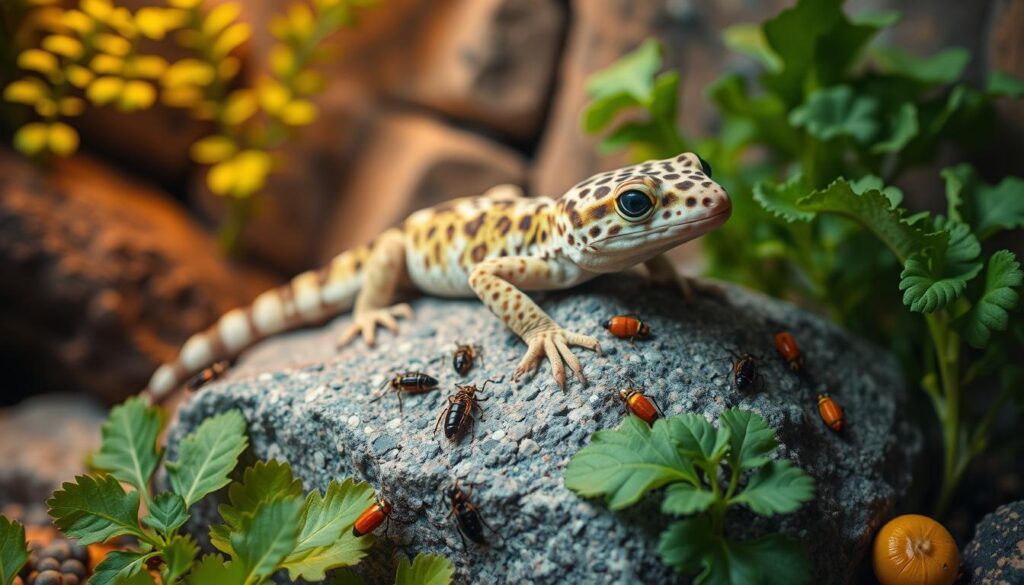
When to Consult a Veterinarian
Leopard gecko health concerns can worry any pet owner. It’s key to spot warning signs and emergency symptoms that need vet help right away. Regular check-ups and good care tips can prevent many health problems. But knowing when to get professional help is vital.
Common warning signs include lethargy, no appetite, or changes in stool or urine. If you see these signs, it’s wise to see a vet to check for health issues. Emergency symptoms like trouble breathing, seizures, or severe injuries need quick vet care and are medical emergencies.
Warning Signs
- Lethargy or unresponsiveness
- Loss of appetite or changes in eating habits
- Changes in stool or urine output
- Difficulty breathing or respiratory distress
Emergency Symptoms
- Seizures or convulsions
- Severe injuries or trauma
- Difficulty moving or paralysis
Getting ready for a vet visit by collecting info on your gecko’s symptoms, medical history, and care tips is helpful. Knowing about health concerns and taking action can keep your leopard gecko well and content.
Creating an Optimal Sleep Environment
Leopard gecko care tips stress the need for a sleep-friendly environment. A good habitat meets their physical and emotional needs. It should be quiet, have the right temperature, and proper lighting for sleep.
Understanding leopard gecko behavior is key. They need 14 hours of daylight in summer and 12 in winter. A cooler night temperature of 60°F is best. Here are some tips for a great sleep space:
- Maintain a basking surface temperature between 94-97°F (34-36°C)
- Keep the warm hide temperature between 90-92°F (32-33°C)
- Ensure the cool zone temperature is between 70-77°F (21-25°C)
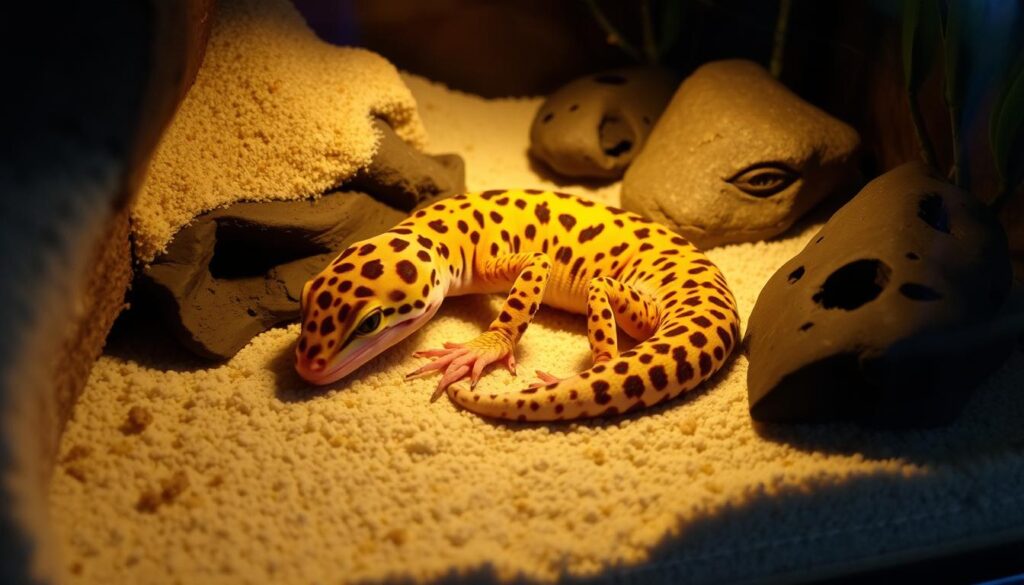
Right lighting is also important. Use UVB and daylight for 14 hours in summer and 12 in winter. Good UVB options include Arcadia Shade Dweller, Arcadia 6%, or ZooMed 5% T5 bulbs. Follow these leopard gecko care tips to support your gecko’s health.
A 75w reptile halogen bulb is enough for basking. Halogen bulbs and deep heat projectors provide the right heat rays.
Creating a great sleep space helps your leopard gecko sleep well. Always think about their comfort and health. If worried, talk to a vet.
| Temperature Range | Lighting Hours | UVB Lighting Options |
|---|---|---|
| 94-97°F (34-36°C) | 14 hours (summer), 12 hours (winter) | Arcadia Shade Dweller, Arcadia 6%, ZooMed 5% T5 |
Conclusion: Ensuring Your Leopard Gecko’s Healthy Sleep Habits
It’s important to make sure your leopard gecko sleeps well. Knowing how they usually sleep and what might make them sleep too much is key. You also need to create a good sleep space for them.
Regular vet visits and a healthy diet are also important. They help keep your gecko happy and healthy overall.
Leopard geckos sleep with their eyes open, unlike humans. They sleep a lot during the day, with only a small part of their sleep being with their eyes closed. Giving them the right amount of light and dark helps them sleep better.
Keeping their habitat at the right temperature and humidity is also important. This helps them sleep well too.
Make sure your gecko has a quiet, safe place to sleep. This helps them get the rest they need. Also, watch out for any health issues or stress that might affect their sleep.
With the right care, your leopard gecko can sleep well and stay healthy.
FAQ
Why is my leopard gecko sleeping so much?
Leopard geckos are most active at dawn and dusk. They sleep a lot during the day, which is normal. But, if they sleep too much, it could mean they’re sick or something in their environment is wrong.
What are the normal sleep patterns of leopard geckos?
Leopard geckos sleep a lot, about 12-14 hours a day. They are most active at night. This is because they are crepuscular animals.
What are the signs of excessive sleeping in leopard geckos?
Signs of too much sleep include being very tired, not wanting to eat, and not responding. If you see these signs, you should take your gecko to a vet.
How can environmental factors affect a leopard gecko’s sleep behavior?
Things like temperature, light, and their home can change how much a leopard gecko sleeps. For example, the wrong temperature can mess with their sleep. Also, bad lighting can stress them out and affect their sleep.
What are the common causes of excessive sleeping in leopard geckos?
Too much sleep can be caused by health problems, like breathing infections. It can also be due to environmental issues, like bad temperatures. Or, it could be because they’re not getting enough nutrients. A vet can help figure out why and how to fix it.
How do seasonal changes affect a leopard gecko’s sleep patterns?
In the winter, leopard geckos might sleep a lot because of brumation. This is a natural way for them to save energy when food is scarce.
What health issues can cause excessive sleeping in leopard geckos?
Health problems like breathing infections, bone disease, and parasites can make leopard geckos sleep too much. If you think your gecko is sick, you should take them to a vet.
How does diet affect a leopard gecko’s sleep patterns?
Eating the right food helps leopard geckos sleep well. A good diet and a regular eating schedule can help keep their sleep patterns normal.
What stress factors can impact a leopard gecko’s sleep patterns?
Stress from handling, their environment, and social interaction can make leopard geckos sleep more. Keeping their environment calm and comfortable can help them sleep better.
When should I consult a veterinarian about my leopard gecko’s sleeping habits?
If your leopard gecko shows warning signs or emergency symptoms, you should see a vet. Signs include being very tired, not wanting to eat, or changes in their stool or urine. Emergency symptoms include trouble breathing, seizures, or serious injuries.
How can I create an optimal sleep environment for my leopard gecko?
To help your leopard gecko sleep well, give them a quiet and comfy place. Keep the temperature right and the lighting good. A well-made habitat that meets their needs can help them sleep better.


